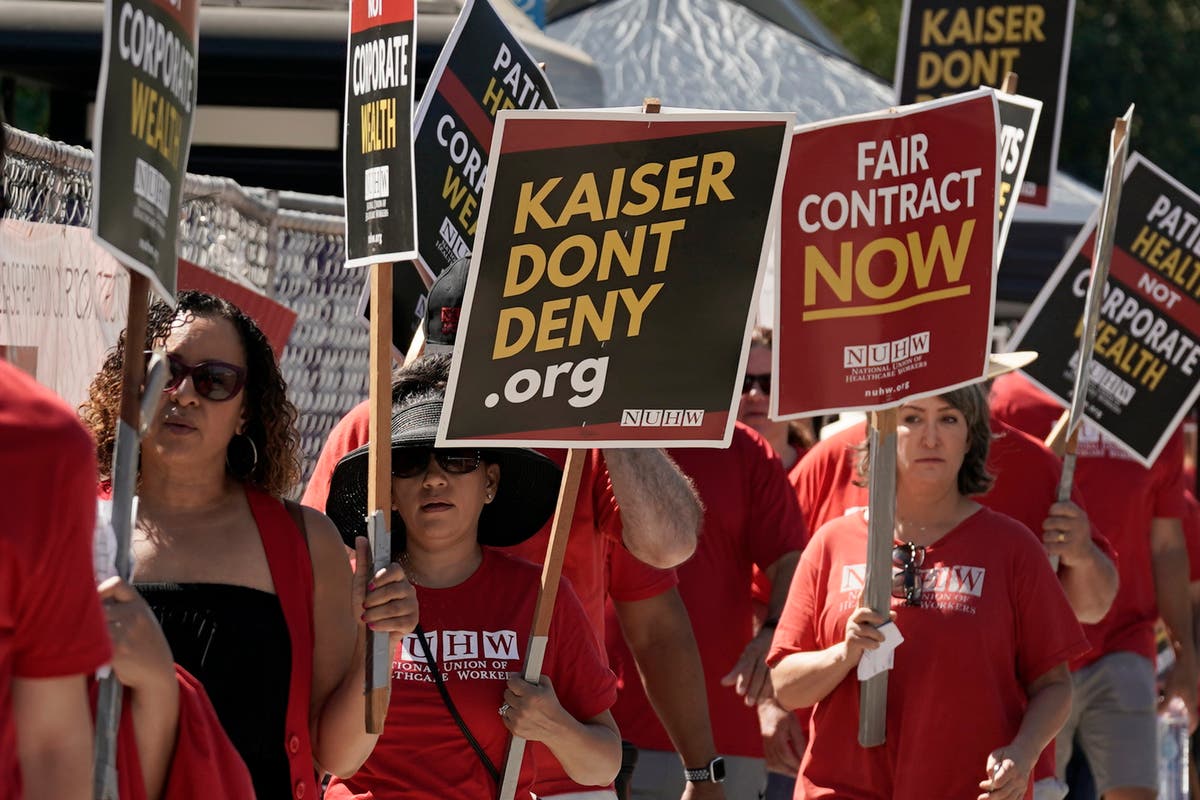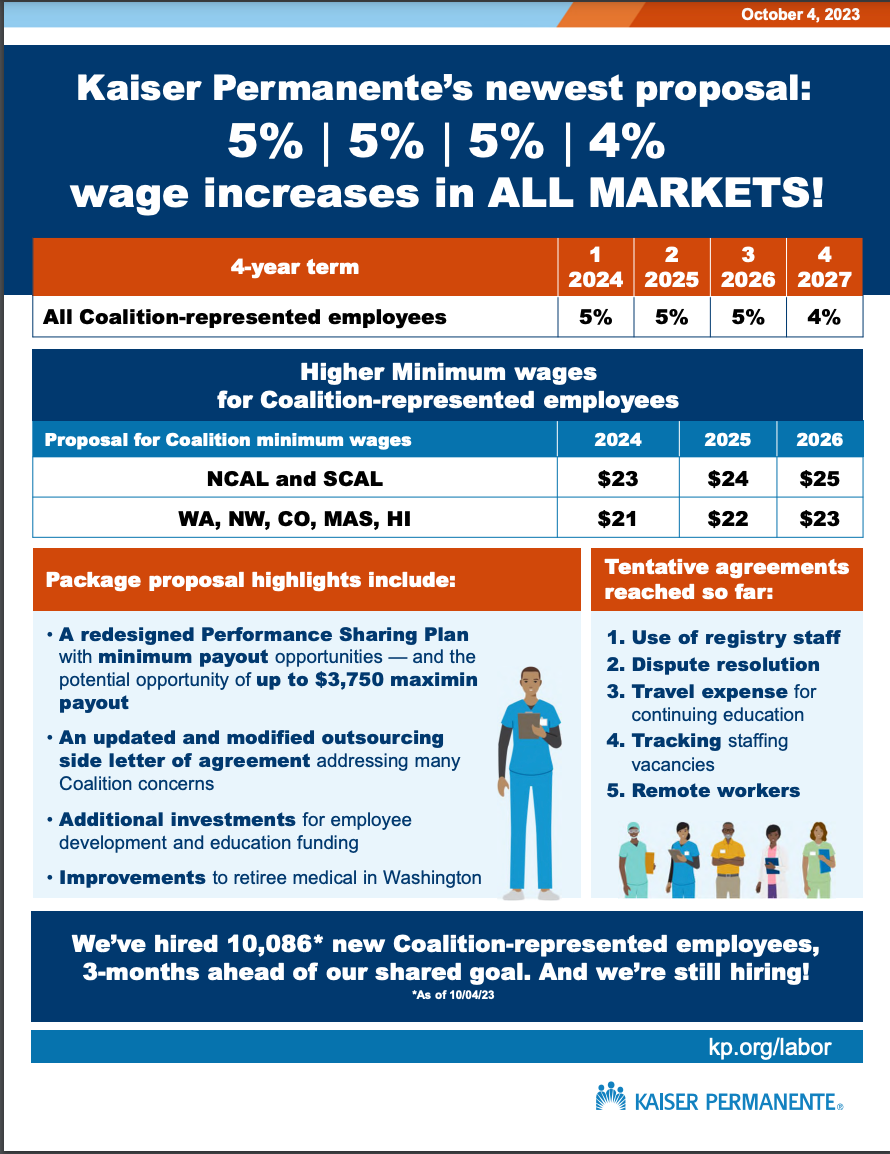Kaiser Permanente healthcare strike could disrupt vaccine and prescription access
The Kaiser strike is expected to span three days, as healthcare workers join picket lines across the country to protest staffing shortages
Your support helps us to tell the story
From reproductive rights to climate change to Big Tech, The Independent is on the ground when the story is developing. Whether it's investigating the financials of Elon Musk's pro-Trump PAC or producing our latest documentary, 'The A Word', which shines a light on the American women fighting for reproductive rights, we know how important it is to parse out the facts from the messaging.
At such a critical moment in US history, we need reporters on the ground. Your donation allows us to keep sending journalists to speak to both sides of the story.
The Independent is trusted by Americans across the entire political spectrum. And unlike many other quality news outlets, we choose not to lock Americans out of our reporting and analysis with paywalls. We believe quality journalism should be available to everyone, paid for by those who can afford it.
Your support makes all the difference.The largest health worker strike went into effect on Wednesday morning, as an agreement between 75,000 healthcare workers and Kaiser Permanente hospitals has yet to be reached.
The strike began on 4 October at 6am PT as the workers — nurses, radiology technicians, pharmacists, sonographers and others — are striking “to protest unfair labor practices and unsafe staffing levels,” according to the latest release from SEIU-UHW, a union that is part of the Coalition of Kaiser Permanente Unions.
The strike will take place across the country in California, Colorado, Washington, Oregon, Virginia and Washington DC and is expected to last three days.
The strike comes after failed negotiations following the workers’ contract expiring on 30 September.
Early on Wednesday, Kaiser Permanente also issued a statement on the progress, saying the two parties are “still at the bargaining table, having worked through the night in an effort to reach an agreement. There has been a lot of progress, with agreements reached on several specific proposals late Tuesday.”
But the coalition was singing to a different tune. “No agreement can be made until Kaiser executives stop bargaining in bad faith and committing unfair labor practices,” said, Caroline Lucas, executive director of the coalition.
The jury is still out on the exact effects the walkout has on patient care, although reports predict vaccine access, prescriptions being filled, and lab testing could be disrupted.
A frontline worker describes the ‘unbearable’ impact of short staffing at Kaiser
Tami Chew has worked for Kaiser Permanente for 17 years.
She previously worked as a pharmacy technician and now works as a health plan representative at Kaiser Roseville, which includes helping patients “who reach a point in their care where they’re not sure what to do, like when they have a difficult diagnosis or need a second opinion.”
The reduced staff has exacerbated the burden on her team to produce results at a rate that is impossible to keep up. In a role like hers, delivering results quickly is crucial. Ms Chew said she often deals with patients who are at risk of losing a limb or their life, so “those decisions need to be made by the organisation within 72 hours.”
But due to understaffing, she can’t always give those results in time, resulting in an absolutely heartbreaking outcome.
Read the full story

Kaiser Permanente frontline worker discusses ‘unbearable’ impact of staffing shortage
Tami Chew is on the picket line after working for Kaiser for 17 years and noticing a ‘deteriorating’ partnership between the coalition and the hospital system
The latest offer from Kaiser Permanente

ICYMI: Timeline that led to the strike
2019: when the last contract was negotiated between the Coalition of Kaiser Permanente Unions and Kaiser
2020: the Covid-19 pandemic rocked the healthcare system, apparently worsening the existing understaffing crisis at Kaiser Permanente, the coalition said
30 September, 2023: contract between the coalition and Kaiser expired
4 October: the coalition launched the largest healthcare worker strike in US history
5 October: both sides say that a deal has not yet been reached
How has the strike affected patient care?
Some experts have said that vaccine access could be disrupted as a result of the walkout as well as other services like lab tests, imaging and the filling of prescriptions.
Still, Kaiser Permanente has reassured that its facilities will remain open. “Our facilities will continue to be staffed by our physicians, trained and experienced managers, and staff, and in some cases we will augment with trained contract workers to serve in critical roles specifically for the duration of a strike,” the hospital system said.
Kaiser also said some elective services and non-emergency care could be rescheduled at a different location, as it is expanding its network to include some non-Kaiser facilities, like hospitals and retail pharmacies.
‘We lauded healthcare workers as heroes. It’s time we compensate them as such’
California Congressman Juan Vargas expressed his support for the walkout.
‘UAW has your back’
UAW workers, who are also striking, showed solidarity for Kaiser healthcare workers.
Who is going on strike at Kaiser Permanente?
Healthcare workers employed at Kaiser Permanente facilities represented by unions. According to the coaltion, some of the jobs affected by the strike include:
- licensed vocational nurses
- emergency department technicians
- radiology technicians
- ultrasound sonographers
- teleservice representatives
- respiratory therapists
- x-ray technicians
- optometrists
- certified nursing assistants
- behavioral health workers
- surgical technicians
- pharmacists and pharmacy technicians
- home health aides
- phlebotomists
- medical assistants
- dental assistants

Join our commenting forum
Join thought-provoking conversations, follow other Independent readers and see their replies
Comments